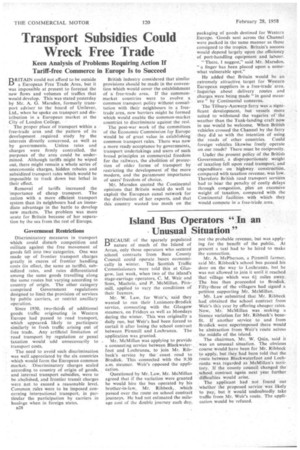Transport Subsidies Could Wreck Free Trade
Page 62

If you've noticed an error in this article please click here to report it so we can fix it.
Keen Analysis of Problems Requiring Action If Tariff-free Conunerce in Europe Is to Succeed
• BRITAIN could not afford to be outside
LP a European Free Trade Area, but it was impossible at present to forecast the new flows and volumes of traffics that would develop. This was stated yesterday by Mr. A. G. Marsden, formerly transport adviser to the board of Unilever, Ltd., when he spoke on transport and distribution in a European market at the City of London College.
The proper place of transport within a free-trade area and the pattern of its development required study by the interests directly concerned, as well as by governments. Unless rates and charges were firmly controlled, the purposes of the area could be undermined. Although tariffs might be wiped out, there might remain a whole series of uneconomic charges, hidden rebates and subsidized transport rates which would be impossible to track down but lethal in their effect.
Removal of tariffs increased the importance of cheap transport. The nation with a more efficient transport system than its neighbours had an immediate advantage in the battle to develop new markets. The problem was more acute for Britain because of her separation by the sea from the rest of Europe.
Government Restrictions
Discriminatory measures in transport which could disturb competition and militate against the free movement of goods fell into two'categories. One was made up of frontier transport charges greatly in excess of frontier handling costs (in effect, the same as tariffs), subsidized rates, and rates differentiated among the same goods travelling along the same routes but varying according to country of origin. The other category comprised Government regulations designed to limit the provision of services by public carriers, or restrict ancillary operation.
Since 1930, two-thirds of additional goods traffic originating in Western Europe had passed to road transport, which appeared. likely to participate similarly in fresh traffic arising out of free trade. Any artificial limitation of • road transport by regulation or penal taxation would add unnecessarily to transport costs.
The need to avoid such discriminatioa was well appreciated by the six countries • which would form the European common market. Discriminatory charges scaled according to country of origin of goods, and internal transport subsidies, were to be abolished, and frontier transit charges were not to exceed a reasonable level. Common rules were to be imposed concerning international transport, in particular the participation by carriers in haulage when in foreign states.
B28 • British industry considered that similar provisions should be made in the convention which would cover the establishment of a free-trade area. If the commonmarket countries were to evolve a common transport policy without consultation with their neighbours in a freetrade area, new barriers might be formed which would enable the common-market countries to discriminate against the rest.
The post-war work of the committees. of the Economic Commission for Europe would be of great value in establishing common transport rules. There was now a more ready acceptance by governments, transport undertakings and users of such broad principles as commercial freedom for the railways, the abolition of protection of older forms of transport by restricting the development of the more modern, and the paramount importance of users' freedom of choice.
Mr. Marsden ouoted the Continental opinions that Britain would do well to exploit the European canal network for the distribution of her exports, and that this country wasted too much on the packaging of goods destined for Western Europe. .Goods sent across the Channel were packed in the same manner as those consigned to the tropics. Britain's success would depend largely upon the efficiency of port-handling equipment and labour.
" There, I suggest," said Mr. Marsden, "a finger has been placed upon a somewhat vulnerable spot."
He added that Britain would be an extremely attractive target for Western European suppliers in a free-trade area. Inquiries about delivery routes and charges were being made "in good measure " by Continental concerns.
The Tilbury-Antwerp ferry was a significant development, hut vessels more suited to withstand the vagaries of the weather than the Tank-landing craft now in use would be welcome. When British vehicles crossed the Channel by the ferry they did so with the intention of usingthe roads of other countries. Could Foreign . vehicles likewise freely operate on our roads? There must be reciprocity.
Under the present policy of the British Government,. a disproportionate weight of taxation fell upon road transport, and expenditure on highway construction, compared with taxation revenue, was low. Therefore British road transport services had to bear the penalty of costly delays through congestion, plus an excessive weight of taxation, compared with the Continental facilities with which they would compete in a free-tr`ade. area.




















































































































